Stop the MAGA-backed pipeline in British Columbia
PRGT is the Prince Rupert Gas Transmission pipeline
As the US president continues to threaten Canada’s economic sovereignty, our own politicians are pushing a false solution that will play right into Trump’s hands: they want to build more American pipelines through B.C.
PRGT is the US-owned Prince Rupert Gas Transmission pipeline. The plan is to build a 750 km pipeline through critical wild salmon watersheds including the Babine, Skeena, Kispiox and Nass. It would supply fracked gas to a floating LNG export terminal in the ecologically significant Nass estuary.
This pipeline would make money for American billionaires, adding insult to injury as Trump continues to threaten the jobs of countless British Columbians.
Nisga’a, Gitanyow and Gitxsan people, community associations, land owners, band councils and other local groups are putting the brakes on this project. Here’s why.
Why?
Backed by MAGA billionaires
PRGT is backed by trillion-dollar Wall Street companies. The investors behind PRGT include billionaires with close, personal ties to Trump.
- Blackstone Inc’s CEO Steve Schwarzman is a longstanding Trump advisor and donated $39M to MAGA candidates in the 2024 election
- Mark Rowan, CEO of Apollo Global Management, PRGT’s earliest investor, was a top contender for Trump’s Treasury Secretary
- Apollo’s board chair, Jay Clayton, was nominated by Trump to be the new US Attorney for Manhattan.
- TC Energy, the former pipeline owner, is still materially involved in the project and remains closely connected with the Trump administration, including family members and former colleagues.
Many of PRGT’s US investors are the very firms that took over the US Gulf Coast with LNG export projects, which rapidly raised utility bills and poisoned entire communities. Allowing PRGT to go ahead would be equivalent to opening our front door and welcoming US exploitation. We should be building Canadian-owned sustainable energy alternatives instead of lining the pockets of MAGA billionaires.


old permits
The B.C. government approved this TC Energy pipeline more than 10 years ago, but was immediately blockaded by Gitxsan leaders and land defenders. Since then, the project has changed many times. The project’s owners no longer want the pipeline to go to Prince Rupert. B.C.’s laws have changed. And the climate has changed too.
The project’s Environmental Assessment Certificate expired on November 25, 2024. The B.C. government must now decide whether to revive PRGT’s 10 year-old certificate, or let the project expire. Indigenous leaders and allied organizations along the pipeline route are calling on the B.C. government to reject PRGT – or at least put this pipeline through a modern Environmental Assessment.
Food, Family, Fresh water: All at Risk
If the pipeline were allowed to proceed, it would cross hundreds of fish-bearing streams and rivers. Fed by glaciers, the Nass and Skeena rivers are a fortress of food security and clean water for Nisga’a, Gitanyow and Gitxsan people. These rivers are currently a major economic driver for the region but must remain intact to continue supporting the local economy. Communities all over B.C. are relying on Nass and Skeena salmon runs due to losing local salmon close to home.
One of the healthiest river systems in the world, the Nass still has five species of salmon, plus steelhead and oolichan.

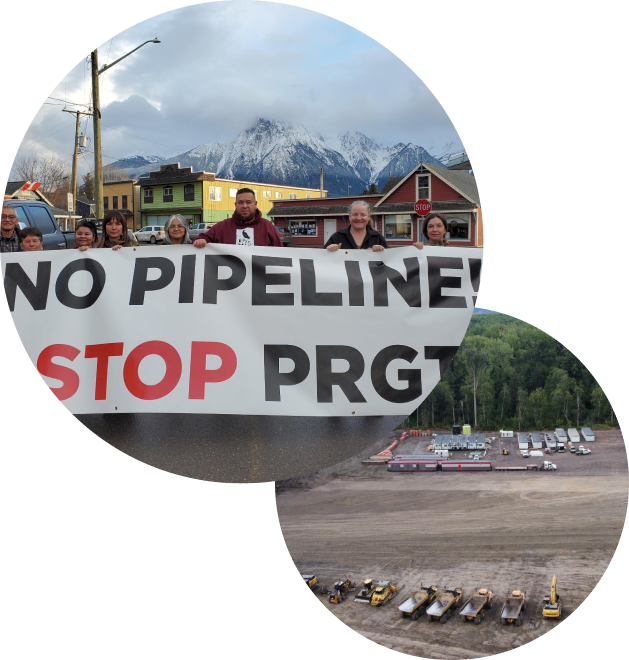
No Consent
The pipeline would cross more than 50km of Indigenous territories where title holders have denied consent for PRGT. Indigenous leaders and nations must be respected when they choose to say no to new proposed projects on their territories for there to be any meaning to claims about reconciliation and free, prior, informed consent (FPIC) by different levels of government. The whole world watched as the Coastal GasLink pipeline was violently forced through Wet’suwet’en territory without consent of hereditary leaders and with RCMP military assault tactics as the modern face of colonial violence – the opposite of reconciliation.
Stand up for British Columbians — We don’t want a MAGA-pipeline in BC
Opposition to PRGT is Wide and Deep
Indigenous land defenders and non-Indigenous allies are working together in the region and across BC to send a powerful message : NO PRGT. This website is supported by the Skeena Watershed Conservation Coalition, Nass Valley Tribal Alliance Society, Kispiox Valley Community Centre Association, Gitxsan Laxyip Youth and Dogwood BC.
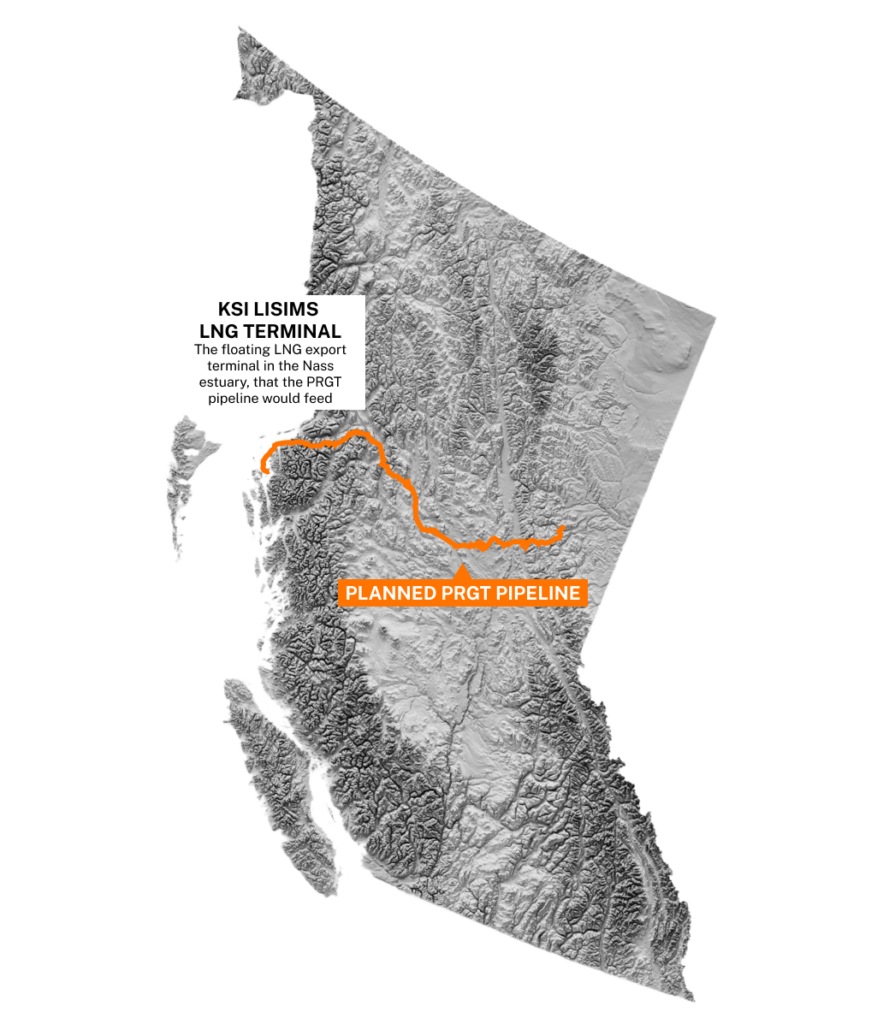
ON THE GROuND
-

PRGT on Social media
@decolonialsolidarity 130+ faith leaders have signed a letter demanding that Canadian financial institutions decline to finance polluting LNG projects in so-called BC, including CGL2, LNG Canada 2, PRGT & Ksi Lisims. @decolonialsolidarity 5 people of faith were arrested at a Pray-in at RBC’s main branch in downtown Toronto. They were protesting the bank’s continued financing
-
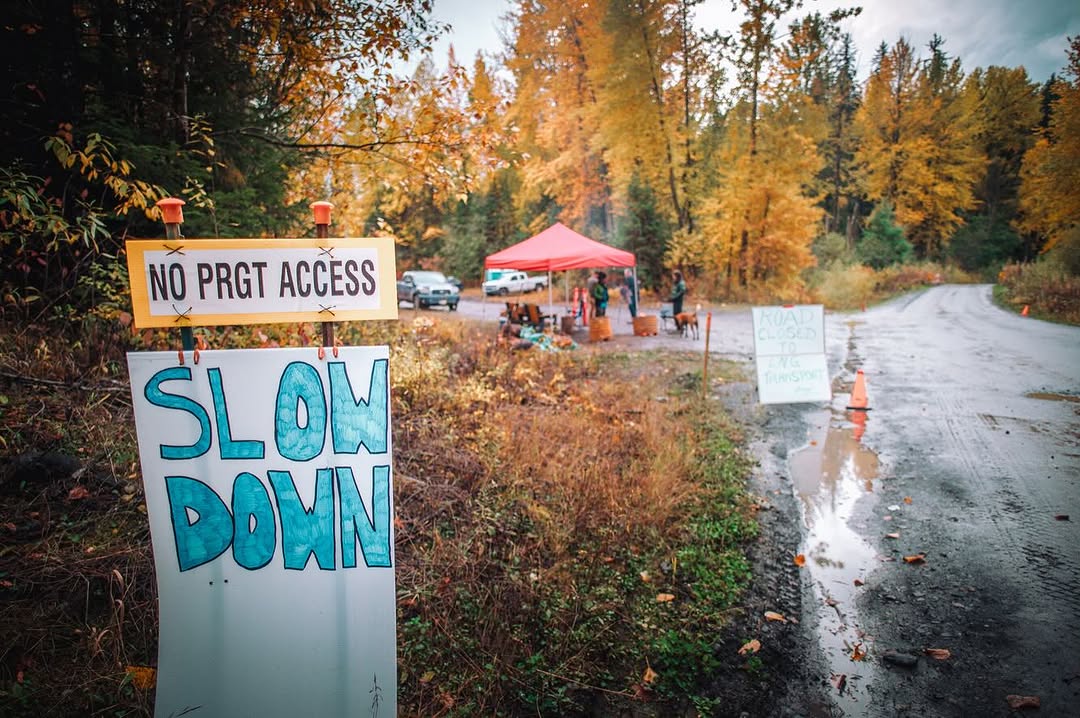
Key Articles
Since August, frontline communities have launched two legal actions against substantial start construction and the Ksi Lisims terminal – the LNG project the PRGT pipeline would feed.
-
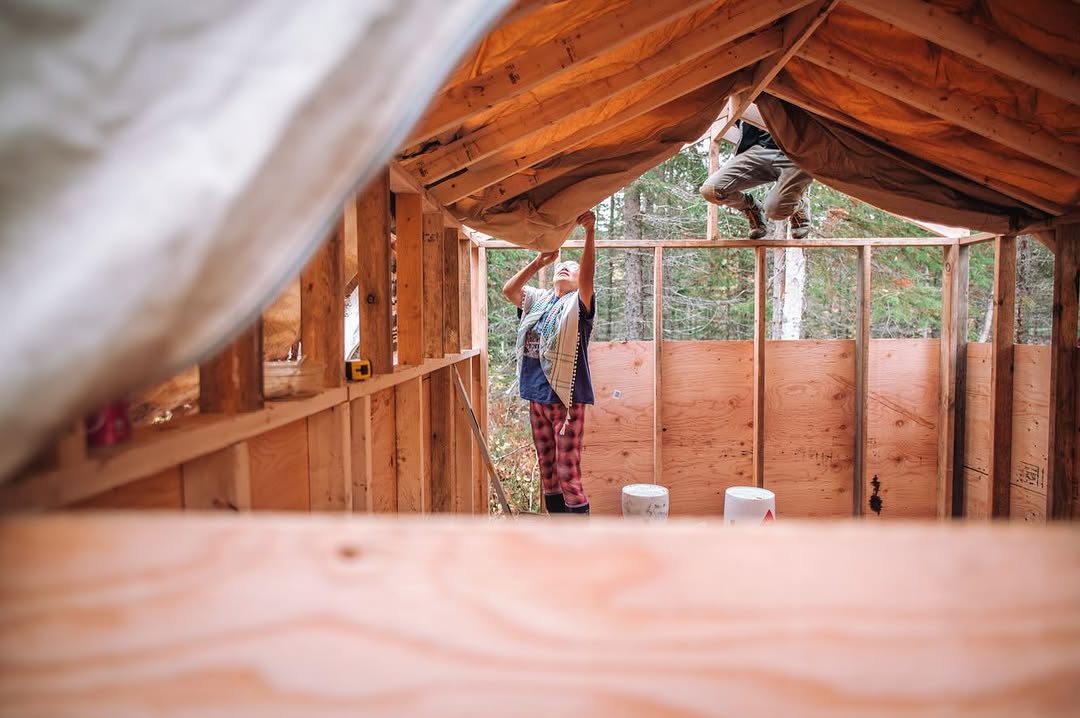
Legal actions
Days before PRGT construction was set to start, Gitanyow Hereditary Chiefs burned their pipeline agreements, closed their territories to all LNG traffic related to the new pipeline and set up a checkpoint on a remote road about 170 km north of Terrace, B.C. The checkpoint, established on August 21, 2024, forced LNG traffic to turn
What’s Next
The BC Government will soon decide whether the PRGT pipeline can move forward or if it needs to begin all over again in a new environmental assessment process. Indigenous leaders and communities along the pipeline route are calling on the BC Government to allow the ten-year old certificate to expire, and order a modern environmental assessment that respects Indigenous rights.
How we
got here
2014
PRGT receives its Environmental Assessment permit and is immediately blockaded by a Gitxsan house group, Luutkudziiwis, at Madii Lii.
2015
Ts’msyen land defenders, supported by allies across the Skeena watershed, reoccupy Lelu Island and block construction of the project terminal.
2017
Petronas officially cancels its LNG terminal, leaving PRGT without a destination. The pipeline is left in limbo for seven years.
June 2024
In June, TC Energy sells PRGT to the Nisga’a treaty government and Texas-based Western LNG, a new company. The new owners propose a new terminal on Pearse Island, far from Prince Rupert.
August 21, 2024
Gitanyow hereditary chiefs and Indigenous youth establish a road checkpoint on their Lax’Yip, stopping PRGT traffic across their territories. The Ganeda (Frog clan) Wilps Watakhayetsxw and Gamlakyeltxw vow that they will not allow the destruction of these lands – this area was identified in the original project review as an extremely valuable site for fish, wildlife and cultural uses. The checkpoint resists the destruction of their traditional and ancestral territories by turning away PRGT construction vehicles, while educating other visitors about their lands as they pass through.
August 22, 2024
To underline their point, Gitanyow chiefs burn the pipeline impact benefit agreement signed in 2014, as the current project no longer resembles the original proposal they signed.
August 24, 2024
In August, PRGT starts logging along the pipeline route on Nisga’a treaty lands (the only place they had permits to work). They clear two per cent of the right-of-way.
At an average width of 25 metres, they clear only half the corridor needed for pipeline construction. They did no grading, dug no trenches and laid no pipe.
They skip over any terrain that could be expensive or challenging: stream crossings and wetlands, steep slopes, rock bluffs and of course the seafloor portion of the route.
They also steer clear of neighbouring Gitanyow and Gitxsan territory, where many house groups oppose the pipeline.
August 27, 2024
Nisga’a member blocks a road leading to a work camp in Nisga’a territory. Their group, the Nass Valley Tribal Alliance Society, launches a local petition with over 200 signatures to explore an injunction against the construction of PRGT.
August 29, 2024
Frontline communities launch legal challenge against the B.C. energy regulator for bending rules and bypassing legal steps to greenlight PRGT’s “substantial start” construction.
October 2024
Opposition expands, as house groups begin establishing permanent cabins and a dog sanctuary on the territories.
October 2024
Simogit Gamlakyeltxw (Wil Marsden), a Gitanyow Hereditary Chief, runs as a Green party candidate in the recent BC election – the only party to oppose the PRGT in their platform.
October 24, 2024
Legal Challenge to Ksi Lisims LNG project
PRGT cannot legally begin construction on over 90 per cent of its route, until the proposed Ksi Lisims LNG project has received a positive final investment decision. Ksi Lisims has not yet received its environmental certificate from the B.C. Environmental Assessment Office and is also opposed by the Lax Kw’alaams First Nation and the Gitanyow Hereditary Chiefs.
Late November 2024
Project proponents file for a “substantially started determination” for the project, in an attempt to avoid a new environmental assessment.
November 25, 2024
First issued in 2014, PRGT environmental certificate expires, alongside all agreements with First Nations.
If the proponents are granted the substantially started determination, the certificate will be extended indefinitely. If not, the project will have to go through a new environmental assessment process under modern environmental laws before proceeding.
The Environmental Assessment Office is putting together a “decision package” for the minister on whether to grant PRGT a permanent certificate, which would open the door to full-scale pipeline construction next year.
November 25, 2024
Gitanyow Hereditary Chiefs issue press release on plan for Indigenous Protected Conservation Area to prevent pipeline resurrection and send message to potential financiers and investors.
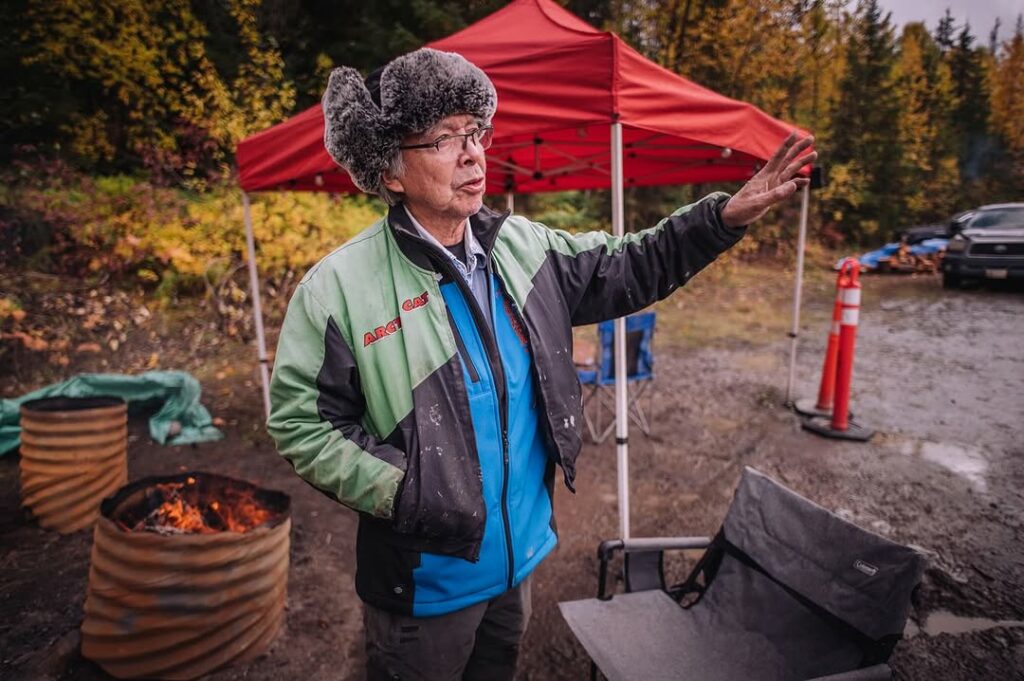
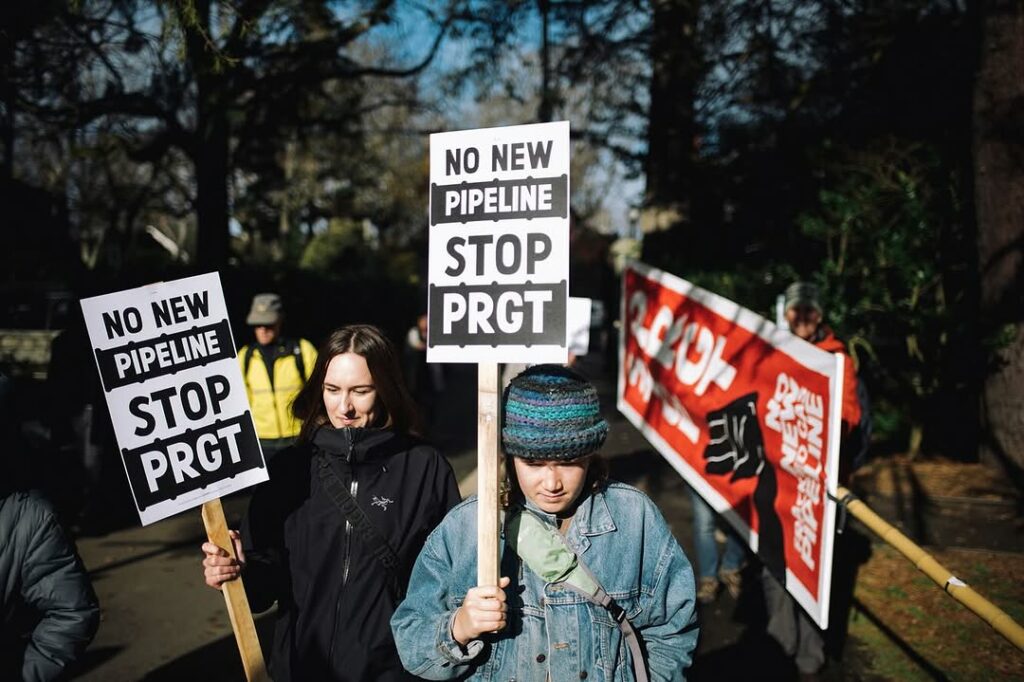

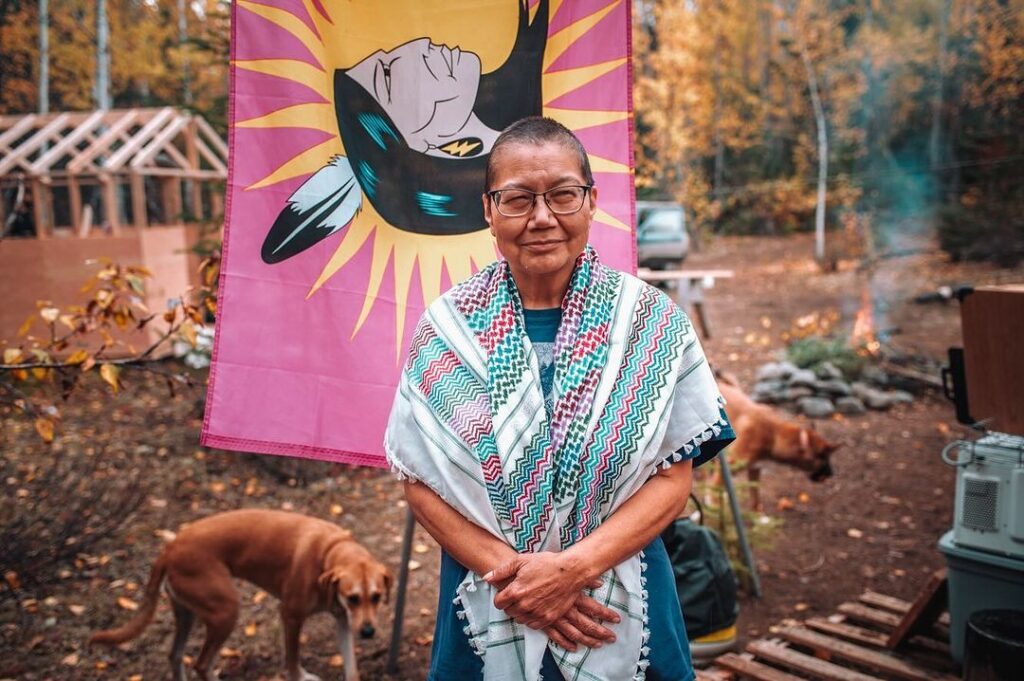
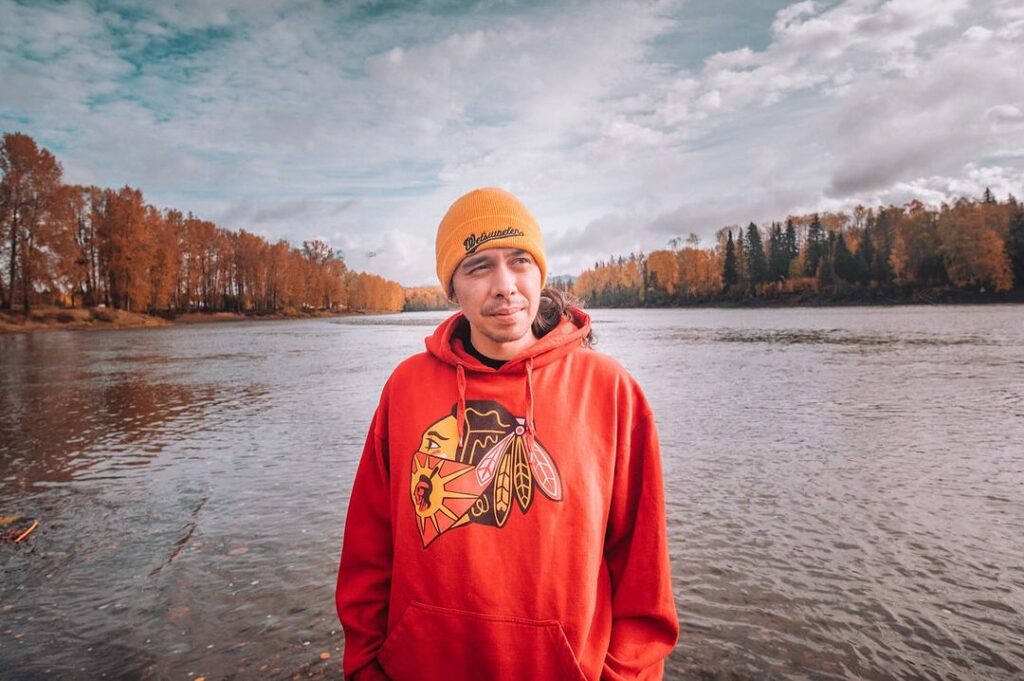

The Future
JUne 2025
Will the BC NDP respect Indigenous rights and demands to put PRGT through a modern environmental assessment? Stay tuned for updates.
Resources

The Gitanyow Hereditary Chiefs, The Tyee, Dogwood BC, The Narwhal and the Skeena Watershed Conservation Coalition have all been sharing important articles and perspectives about PRGT and Ksi Lisims – the LNG project the pipeline would feed.
YINTAH Film
CBC Docs – Approving PRGT would spark a major conflict with Gitanyow and Gitxsan hereditary chiefs on the scale of Coastal GasLink – or worse.
Elbows up? the Canadian projects helping Trump’s inner circle
The Toronto Star
Webinar with frontline leaders on PRGT
Peace Brigades International – Canada
Analysis on economic reconciliation
The Narwhal
Take
Action
Digital Action
BC should not be funneling more profit to the billionaires funding Donald Trump’s political movement. Tell Premier David Eby to stop the PRGT pipeline and protect our province from American takeover.
Get Organized
Take your action beyond the screen – talk to your friends and local organizations about standing in solidarity with frontline land defenders against PRGT. Solidarity groups in Victoria, Vancouver and Squamish have organized multiple sit-ins at Ministry offices, rallies, banner drops, street theatre, bake sales, benefit concerts, and most recently built a tiny-house for frontline resistance!
Sign the Solidarity Statement from The Youth of the Gitxsan Laxyip
By signing the petition, you are showing your solidarity with the youth who are opposing the PRGT pipeline and advocating for responsible leadership, environmental protection and cultural resurgence.
Donate
Show your support to Teresa Brown’s Land defence and Dog Sanctuary, located on the PRGT pipeline right-of-way on Gitxsan Laxyip.
To support, send donations via e-transfer/paypal to landbackcc@gmail.com
You can also support Teresa’s dog sanctuary and cabin build by buying Gitxsan land defense fundraiser t-shirts and hoodies.
Say no to PRGT